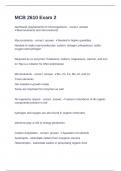-
1. Tentamen (uitwerkingen) - Guest lecture questions with complete solution 2024/2025
-
2. Tentamen (uitwerkingen) - Mcb 2610 chapter 6 question and answers rated a+ 2024/2025
-
3. Tentamen (uitwerkingen) - Mcb 2610 chapter 7 part 1 question and answers 100% correct 2024/2025
-
4. Tentamen (uitwerkingen) - Mcb 2610 exam 1 question and answers already passed 2024/2025
-
5. Tentamen (uitwerkingen) - Mcb 2610 exam 1 question and answers verified to pass 2024/2025
-
6. Tentamen (uitwerkingen) - Mcb 2610 exam 1 question and answers correctly solved 2024/2025
-
7. Tentamen (uitwerkingen) - Mcb 2610 exam 1 questions wth complete solution 2024/2025
-
8. Tentamen (uitwerkingen) - Mcb 2610 exam 1 question and answers rated a+ 2024/2025
-
9. Tentamen (uitwerkingen) - Mcb 2610 exam 1 chapter 1 question and answers 100% correct 2024/2025
-
10. Tentamen (uitwerkingen) - Mcb 2610 exam 1 question and answers already passed 2024/2025
-
11. Tentamen (uitwerkingen) - Mcb 2610 exam 1 question and answers correctly solved 2024/2025
-
12. Tentamen (uitwerkingen) - Mcb 2610 exam 1 questions with complete solution 2024/2025
-
13. Tentamen (uitwerkingen) - Mcb 2610 exam 1 question and answers rated a+ 2024/2025
-
14. Tentamen (uitwerkingen) - Mcb 2610 exam 1 microbe minutes question and answers 100% correct
-
15. Tentamen (uitwerkingen) - Mcb 2610 exam 1 microscopy question and answers already passed 2024/2025
-
16. Tentamen (uitwerkingen) - Mcb 2610 exam 1 questions and answers verified to pass 2024/2025
-
17. Tentamen (uitwerkingen) - Mcb 2610 exam 1 question and answers correctly solved 2024/2025
-
18. Tentamen (uitwerkingen) - Mcb 2610 exam 2 questions with complete solution 2024/2025
-
19. Tentamen (uitwerkingen) - Mcb 2610 exam 2 question and answers rated a+ 2024/2025
-
20. Tentamen (uitwerkingen) - Mcb 2610 exam 2 question and answers already passed 2024/2025
-
21. Tentamen (uitwerkingen) - Mcb 2610 exam 2 guest lecture question and answers already passed 2024/2025
-
22. Tentamen (uitwerkingen) - Mcb 2610 exam 2 question and answers verified to pass 2024/2025
-
23. Tentamen (uitwerkingen) - Mcb 2610 exam 2 question and answers verified to pass 2024/2025
-
24. Tentamen (uitwerkingen) - Mcb 2610 exam 2 question and answers verified to pass 2024/2025
-
25. Tentamen (uitwerkingen) - Mcb 2610 exam 3 question and answers correctly solved 2024/2025
-
26. Tentamen (uitwerkingen) - Mcb 2610 exam 3 questions with complete solution 2024/2025
-
27. Tentamen (uitwerkingen) - Mcb 2610 exam 3 question and answers rated a+ 2024/2025
-
28. Tentamen (uitwerkingen) - Mcb 2610 exam 3 question and answers 100% correct 2024/2025
-
29. Tentamen (uitwerkingen) - Mcb 2610 exam 4 microminutes question and answers already passed 2024/2025
-
30. Tentamen (uitwerkingen) - Mcb 2610 exam 4 question and answers verified to pass 2024/2025
-
31. Tentamen (uitwerkingen) - Mcb 2610 exam question and answers correctly solved 2024/2025
-
32. Tentamen (uitwerkingen) - Mcb 2610 final questions with complete with complete solution 2024/2025
-
33. Tentamen (uitwerkingen) - Mcb 2610 lab 1 question and answers rated a+ 2024/2025
-
34. Tentamen (uitwerkingen) - Mcb 2610 lab question and answers 2024/2025
-
35. Tentamen (uitwerkingen) - Mcb 2610 lab question and answers verified to pass 2024/2025
-
36. Tentamen (uitwerkingen) - Mcb 2610 lab question and answers already passed 2024/2025
-
37. Tentamen (uitwerkingen) - Mcb 2610 lab question and answers correctly 2024/2025
-
38. Tentamen (uitwerkingen) - Mcb 2610 lab question and answers correctly solved 2024/2025
-
39. Tentamen (uitwerkingen) - Mcb 2610 lab exam 1 questions with complete solution 2024/2025
-
40. Tentamen (uitwerkingen) - Mcb 2610 lab exam i questions with complete solution 2024/2025
-
41. Tentamen (uitwerkingen) - Mcb 2610 lab question and answers 100% correct 2024/2025
-
42. Tentamen (uitwerkingen) - Mcb 2610 lab final question and answers already passed 2024/2025
-
43. Tentamen (uitwerkingen) - Mcb 2610 lab question and answers already passed 2024/2025
-
44. Tentamen (uitwerkingen) - Mcb 2610 lab practical 1 question and answers verified to pass 2024/2025
-
45. Tentamen (uitwerkingen) - Mcb 2610 lab practical 2 question and answers correctly solved 2024/2025
-
46. Tentamen (uitwerkingen) - Mcb 2610 lab practical 3 question and answers verified to pass 2024/2025
-
47. Tentamen (uitwerkingen) - Mcb 2610 lab practical questions with complete solution 2024/2025
-
48. Tentamen (uitwerkingen) - Mcb 2610 lab practical question and answers already passed 2024/2025
-
49. Tentamen (uitwerkingen) - Mcb 2610 lab practical question and answers verified to pass 2024/2025
-
50. Tentamen (uitwerkingen) - Mcb 2610 lab practical question and answers verified to pass 2024/2025
-
51. Tentamen (uitwerkingen) - Mcb 2610 lab quiz questions and answers correctly solved 2024/2025
-
52. Tentamen (uitwerkingen) - Mcb 2610 lab quizzes week 2 question s with complete solution 2024/2025
-
53. Tentamen (uitwerkingen) - Mcb 2610 lab questions and answers verified to pass 2024/2025
-
54. Tentamen (uitwerkingen) - Mcb 2610 microbe minutes exam 1 question and answers verified to pass 2024/2025
-
55. Tentamen (uitwerkingen) - Mcb 2610 microbe minutes exam 1. question and answers correctly solved 2024/2025
-
56. Tentamen (uitwerkingen) - Mcb 2610 microscope exam 1 question and answers correctly solved 2024/2025
-
57. Tentamen (uitwerkingen) - Mcb 2610 questions with complete solution 2024/2025
-
58. Tentamen (uitwerkingen) - Uconn mcb 2610 final lab practical question and answers rated a+ 2024/2025
-
59. Tentamen (uitwerkingen) - Uconn mcb 2610 question and answers 100% correct 2024/2025
-
60. Tentamen (uitwerkingen) - Uconn mcb2610 exam 1 question and answers correctly solved 2024/2025
-
Meer zien




